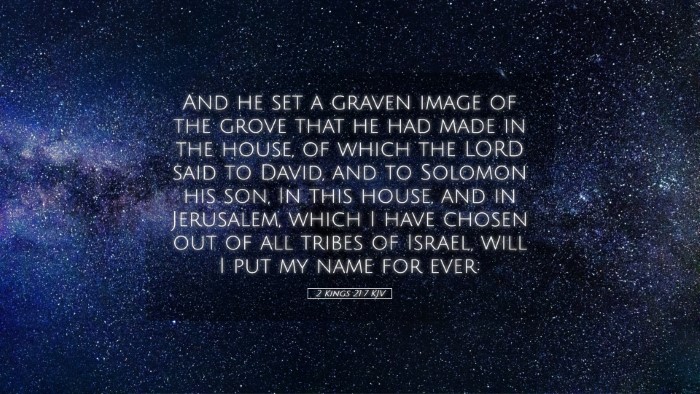Commentary on 2 Kings 21:7
In 2 Kings 21:7, we find a pivotal moment in the history of Judah, as the text addresses the serious consequences of idolatry and the violation of God’s commandments by King Manasseh. The verse states:
“And he set a graven image of the grove that he had made in the house, of which the Lord said to David and to Solomon his son, In this house, and in Jerusalem, which I have chosen out of all tribes of Israel, will I put my name for ever.” (2 Kings 21:7)
Historical Context
Manasseh, as recorded in the earlier chapters of 2 Kings, represents one of the most reprehensible kings of Judah. His reign is marked by significant religious and moral decline, as he leads the nation into idolatry and practices that are abhorrent to God.
The Setup of Idolatrous Worship
According to Matthew Henry, the action of erecting a graven image within the house of the Lord signifies a direct affront to the divine sanctuary and a perversion of what was intended to be a place of worship for the true God. Henry emphasizes the violation of the second commandment as Manasseh introduced elements from pagan worship into the sacred space designated for Yahweh.
Significance of the Graven Image
Albert Barnes expounds on the nature of the 'graven image of the grove', describing it as a representation of Asherah, a pagan goddess associated with fertility and the natural world. This idol not only represents the physical act of idolatry but symbolizes the spiritual adultery of Israel against their covenant with God. Barnes notes that the presence of such an idol in the temple not only corrupts the worship of YHWH but also invites divine judgment upon the people.
Divine Sovereignty and Judgment
Adam Clarke draws attention to the divine declaration regarding the temple, which the Lord entrusted to David and Solomon. Clarke highlights that God's intention to place His name in Jerusalem underscores the exclusivity of Israel’s worship. By erecting a graven image, Manasseh not only disregards this sacred space but also provokes God's anger, leading to judgment and eventual destruction. Clarke further suggests that the choice of Jerusalem as the locus of divine presence reinforces the gravity of Manasseh's actions.
Theological Implications
The act of placing an idol in the holy temple serves as a profound illustration of the conflict between divine authority and human rebellion. It raises vital theological questions about idolatry, faithfulness, and the consequences of turning away from God. The following implications can be drawn:
- Idolatry as Spiritual Infidelity: The act of Manasseh signifies an unfaithfulness that reverberates through the covenant relationship. This illustrates the theme that idolatry is not merely about the physical act of worshiping other gods but also represents a breach of covenant loyalty.
- Divine Judgment is Inevitable: The narrative emphasizes that choosing to disregard God's commandments results in inevitable consequences. As seen throughout the biblical text, God is steadfast in His holiness and will not permit violation of His commands without consequences.
- The Importance of Covenant Faithfulness: This episode in Israel's history affirms the necessity for leaders to lead their people faithfully according to God's instructions. The failure of Manasseh stands as a cautionary tale for all who are in positions of authority within the church and community.
Conclusion
2 Kings 21:7 serves as a sobering reminder of the consequences of idolatry and disobedience to God. The legacy of King Manasseh, intertwined with the worship of graven images in the temple, warns future generations of the dangers of diverting from the prescribed path of covenantal faithfulness. In reflecting on this verse, pastors, students, and scholars are challenged to examine their own hearts and communities for the subtle ways in which they may stray from true worship and fidelity to God.


